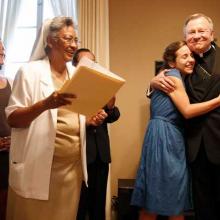Calling
When campus life shuttered in March to slow the spread of the coronavirus, more than 14 million students across the nation were forced to adapt to new routines. Campus lawns speckled with students gave way to uniform rows of faces on video calls. The now coined “Zoom fatigue” replaced “pulling an all-nighter” at the library.
While the pandemic has strained students from all academic disciplines, seminary and divinity students have felt unique pressure as they discern calls to enter positions and spaces of worship that may not resemble what they did before the virus took hold.
Four students shared with Sojourners what their studies look like amid the pandemic and how this moment is shaping their call.

Sister Monica, shown outside her home, has spent her career ministering to transgender people. Photo via Philip Scott Andrews / RNS
Sister Monica lives alone in a small house at the edge of a Roman Catholic college run by a community of nuns.
She doesn’t want to reveal the name of the town where she lives, the name of her Catholic order, or her real name.
Sister Monica lives in hiding, so that others may live in plain sight.
Now in her early 70s and semiretired because of health problems, she remains committed to her singular calling for the past 16 years: ministering to transgender people and helping them come out of the shadows.
I am the Dean of Students at Covenant Theological Seminary, the National Seminary of the Presbyterian Church in America (PCA). I am the pastor of South City Church in Saint Louis. South City Church is a PCA congregation, and it is predominantly white. I am a retired full colonel PCA Army chaplain. I was born and raised in North Saint Louis city. My father now lives in Ferguson, Mo. I am a black man. If that comes as a shock, believe me I understand; it is a shock to me every morning when I wake up and go to work at Covenant Seminary in West Saint Louis County, a mostly wealthy and white suburb. It shocks me every time I walk into my church in South Saint Louis and remember that I am one of only 47 black pastors in my denomination and that I work in a mostly white conservative, evangelical church. I am constantly at the feet of Jesus asking for help in navigating the racial, cultural, and generational waters around me. It is a wonderful opportunity, but it is challenging for someone like me; I grew up believing that white people never really wanted to be in close proximity to black people unless they were the ones controlling the situation. There was also the belief that the only black people who were successful in white organizations were the ones who did not mind being tokens without real dignity in the system. There may be people who believe these things about me. I have even questioned myself as to why I have been given so many opportunities in the PCA. I sometimes don’t like the answers that come to mind.
Recently, a young pastor asked my opinion on cross-cultural ministry. He asked me how an African American got two positions as both Covenant’s Dean of Students and as pastor of South City Church. I explained, “it makes no sense, since so much of the history in our denomination makes me the wrong guy for the job! But through God’s sovereign will, here I am!” His response was, “I guess God always sends the wrong messenger.”
IT IS EASY, and a lot more comfortable, to identify and name dysfunction outside your family. It’s an entirely different endeavor, however, to label inappropriate behavior in your own home.
That’s the situation I find myself in as a lifelong member of the black Baptist tradition—one that, by and large, refuses to ordain women ministers and call them into the pastorate. I can no longer keep silent. My spirit won’t let me be quiet about a system where injustice is nurtured.
Women are the backbone of African- American Baptist congregational life, yet they traditionally have been blocked from ordained ministry. I’ve watched this for years in Kentucky where I was born, raised, and currently live; experienced it in other places where I have resided; and heard the same story from Baptist female colleagues in ministry around the country. The same is also true in many white Baptist congregations, such as those affiliated with the Southern Baptist tradition. But I’m speaking here about the world I know personally.
Ironically, some of these black congregations and pastors who are unwilling to honor God’s call on the lives of women seeking ordination are the same ones who are quick to name a plethora of injustices perpetrated against black people as a race, and to demand quick resolution.
Doors for women called to preach the gospel of Jesus Christ have opened a little in recent decades. More women are being licensed, the precursor to ordination in the Baptist structure. But the process usually stops there, and women are left patiently waiting to be blessed into the fold. These “ladies in waiting” are allowed to lead ministries, teach, and occasionally preach, but rarely permitted to go beyond that.
IN 1900, long-simmering resentment over increasing foreign presence and exploitation in China boiled over into a full-scale uprising, the Boxer Rebellion. It was spearheaded by the “Righteous and Harmonious Fists,” a peasant secret society whose members practiced martial arts—Westerners, observing their exercises, dubbed them “Boxers.” The Boxers targeted foreign officials, merchants, and missionaries, as well as Chinese Christian converts.
Comic book author and artist Gene Luen Yang illuminates two very different fictional perspectives on this conflict in his new two-volume graphic novel Boxers & Saints: The first volume, Boxers, tells the story of Bao, a boy who becomes a Boxer leader after seeing ongoing abuse by Westerners; Saintsfollows Four-Girl, an unwanted daughter who converts to Catholicism, takes the name Vibiana, and must flee the Boxers.
Yang’s 2006 work American Born Chinese was the first graphic novel to both win the Michael L. Printz Award for excellence in young adult literature and to be nominated for a National Book Award. He lives in Oakland, Calif., and teaches in the Hamline University MFA program in writing for children and young adults. Sojourners senior associate editor Julie Polter interviewed Yang in July. Boxers & Saints releases in September from First Second Books.
Julie Polter: The characters in Boxers & Saints are driven by varied combinations of ideology (patriotism, cultural imperialism) and mysticism/faith. The flaws and virtues of different beliefs seem to mirror each other. What led you to this complicated story?
Gene Luen Yang: The genesis of the project was out of my own conflicts. I majored in computer science in college and minored in creative writing. I had a professor who was also a novelist, Thaisa Frank. I remember visiting her during office hours and talking to her about my struggles with writing about issues of faith. Faith, especially in college, became very important to me; it became a critical part of how I saw my place in the world. It was really hard for me to put something authentic on the page. Her advice to me was, essentially, you have to write your life and live your faith—you don’t ever try to write your faith, because it will come out funky. That’s the advice I’ve tried to follow ever since.
WHEN I FIRST started attending the Church of the Apostles in Fairfax, Va., we had no church building and met in the cafeteria of an elementary school. There were about 50 of us and a brand new priest, Rev. H. Lawrence Scott (“Call me Renny”). It was an Episcopal church in Fairfax County in the 1970s. Really, how much trouble could I get into?
What I didn’t know was that it was a charismatic, Bible-believing, tongues-speaking church. The praise band led us in worship. We sang and raised our hands. There was speaking in tongues and interpretation.
When I committed my life to Jesus in October 1977, I was sitting in the living room with Renny and his wife, Margaret. We had lunch. We talked. I disagreed with them about this Jesus stuff. We talked some more, and I was shocked to find myself saying “yes” when Renny asked if I was ready to commit my life to Jesus. I just said sure—then Renny made me pray. I remember walking to the car and having a brief conversation with God, the culmination of which was that I said I would never be a missionary to Africa. It’s funny what I thought were the key questions then.
Because I am an all-or-nothing person, I threw myself entirely into this new life. Within a few weeks I was baptized in the Spirit. I went to a Bible study every week. When I heard you were supposed to have a quiet time, I did that religiously. Every morning I sat and waited on God: Bible reading and prayer, other spiritual reading, and index cards to help me remember. Every morning for years I got up very early and met with Jesus in the quiet before dawn. Between my study and the praise songs we sang at church, I learned hundreds of scriptures by heart.
LAUGHTER IS Sacred Space: The Not-So-Typical Journey of a Mennonite Actor has the narrative arc of a classic Greek tragedy: Boy from religious sect grows up, becomes a butcher, goes to seminary, then finds acting acclaim as part of a duo (Ted & Lee), only to have his comedic partner die by suicide, after which the show must go on and does.
Ted Swartz’s story is a bittersweet tale, with emphasis on the sweet. It is told in the structure of a five-act play. What originally drew me was the fact that Swartz’s late acting partner, Lee Eshleman, was a classmate of mine at Eastern Mennonite University, where we were art majors to-gether. Eshleman was easily the most talented among us. (His line drawings illustrate the book.) He was also smart, funny, and regal.
After I left EMU, unmarried and pregnant, I would sometimes see Eshleman’s name on the masthead of the alumni magazine and think, “I wish I had it as together as Lee does.” It was a shock to hear that, like my own son, Eshleman too had died by suicide.
His death and its impact on Swartz take up a good deal of space in this memoir. The duo worked together for 20 years, and Swartz is honest about the ups and downs of their friendship. He does a great job of communicating that Eshleman was much more than his suicide or his bipolar disorder. He was that extraordinary person I remember.
I’ve been asked how I knew I was called to be a writer. For me, calling is fairly easy to recognize. If the thought of doing something fills you with equal parts joy and terror, it’s probably a calling.
There’s more to it than that, I suppose, since the idea of buying a new Tesla sports car fills me with both feelings too, mostly because my wife, Amy, would kill me. There are other elements, like the conviction that our calling should feel something of an identifiable need in the world, and that it should call on gifts we have in a way that is life-giving not just to others, but joyful and life-affirming for us as well.
But the joy and terror thing is a pretty good sign you’re on the right track.
It was December of 2000, but I remember the occasion as if it were yesterday.
It was a few days after Christmas during my senior year of college. I was quite nervous, and I wondered how my friends and family would react.
How would my basketball teammates respond? Would my roommates treat me differently? And of course, what about my girlfriend? She had no idea our relationship would take such a dramatic turn.
I could hide no longer. I had to be honest with who I was. And so, after a great deal of delay and long nights of nervous planning, I finally decided to share what I had been keeping secret.
Beginning with my girlfriend, then my parents, brother, sister, and eventually friends, roommates, and teammates, I shared the news: After a significant amount of prayer and discernment, I was no longer planning to attend law school following college graduation, but instead, I wanted to attend seminary in order to become an ordained Lutheran pastor.
As to be expected, I received mixed reactions.
My parents were confused and surprised, as they – like most people – had not perceived me as “religious”," especially not to the point of pursuing ordination. Nevertheless, they accepted the news with delight and affirmation.
In addition, my girlfriend (who is now my wife) was wonderfully supportive. So was my brother, sister, and closest friends.
On the other hand, some others were not sure how to react. My friends – mostly uninterested in religion – wondered about future plans. Basketball teammates were a bit uneasy. And even the campus priest and a few professors had an assortment of reactions. While a number of people were anxious and apprehensive, those within my closest circle of friends accepted the announcement with open arms.
I continue to thank God for such a wonderful web of support.
An open letter to my beloved sons, in whom I am well pleased,
I'm writing this fatherly letter about the difference between a career and a vocation. I learned this wisdom from Jim Forest, an old man who was a famous peace activist in the 1960s and walked many of the top spiritual activists of the 20th century. He personally taught me some important lessons on vocation that might be very helpful to you, and he specifically had you three in mind when he shared this.
When I say "career," I mean the idea of a job that you work at to make money, get promotions, become an expert, and eventually retire and earn a pension. There's nothing really wrong with having a career, or even a few careers. For example, you could say I was a "career pastor" for 20 years.
But there is something more important that we call a "vocation." A vocation may also include getting a paycheck and going to a workplace, but there is much more. A vocation is a "calling" that can span over many careers. For example, I think by vocation I am called to teach. I did that as a youth pastor, a church-planter, a college teacher, a seminar facilitator, an author, and a publisher. All of those mini-careers are just the platform I used to live out my calling.
In what is being described as the first of its kind in the U.S., the Archdiocese of New Orleans has transformed a vacant church rectory into a group house where single women will live together while deciding whether to undertake lives as nuns.
The center, dedicated on Aug. 15, occupies the second and third floors of the St. Rita rectory. Within a few days, two women, then perhaps three more, will move into the spotless rectory, their collective lives to be superintended by two veteran nuns who will show the younger women the dynamics of shared community life.
“How we live in community. How to communicate. How to share,” said Sister Carmen Bertrand, for 48 years a member of the Sisters of the Holy Family.
Beyond orienting them to the rhythms of community life, Bertrand and her colleague, Sister Diane Roche, a Religious of the Sacred Heart, will teach the tenants various modes of prayer, organize occasional retreats, and bring in representatives of other religious orders to present themselves and their ways of life.
I want to tell you the story of one brave woman who has given her life to live in the East Garfield Park neighborhood of Chicago.
Arloa Sutter is one of my new heroes. Let me tell you why.
I met Arloa through the Redbud Writers Guild to which we both belong. Last month I had the honor of meeting her at our guild retreat. I had no idea what a culture rebel she was.
Arloa didn't begin her days of serving the inner-city poor as the grandmother she is today, but as a young woman. It all began with her church staff not knowing what to do with the many people who came into the building during the week needing assistance. Instead of pushing them out the door, she created a storefront room that provided food,l friendly conversation and a hot cup of coffee to those wishing to escape the cold. This eventually evolved into her gathering a board of directors to form Breakthrough Ministries in 1992.
She didn’t know what she was doing, but she did it anyways. I love gutsy people like that.
I’ve moved five times in five years of marriage. My husband is a pastor. I am a journalist. He is forever discerning, forever visioning— I am forever antsy.
This latest move to Washington, D.C., led me to think a lot about the “call” to serve. My husband and I were dating, then engaged, then married during his four years at seminary. I suppose I knew what I was getting myself into. (Nope, not one little bit.)
During those years, it was drilled into my brain that even though I felt a “calling” as a writer, a storyteller, etc., it was extremely different from the call.
Read: What your husband is doing is more important than anything you will ever do in your lifetime — ever. Except maybe have his progeny, and then, still, it’s a toss-up.









